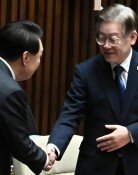Gov't sticks to revision bill on inter-Korean exchange and cooperation
Gov't sticks to revision bill on inter-Korean exchange and cooperation
Posted August. 28, 2020 07:59,
Updated August. 28, 2020 07:59
The South Korean Ministry of Unification announced on Thursday to legislate a revision bill on inter-Korean exchanges allowing North Korean businesses to earn a profit on South Korean soil and permitting installation of offices of South Korean companies within the North. Even with room for infringement on Washington-led sanctions against Pyongyang as pointed out during the early stages of legislation, the ministry decided to maintain the original version of the revised bill. Instead, a step was taken backward to simplify procedures for meeting North Korean citizens by exempting prior declaration. Nevertheless, the ministry showed a possibility of pushing for it when things allow.
A revised legislation specifies the range of inter-Korean economic exchanges by adding a new paragraph (Article 18-3) on economic cooperative business. It provides the basis on which South and North Korean businesses can make money jointly or independently in the two Koreas and any third-party country. In particular, if the bill passes the National Assembly, North Korean businesses may own shares, real estate properties and copyrights of South Korean entities.
The problem is that it may go against the United Nations Security Council Resolution 2371 on North Korea adopted in 2017 to ban new joint ventures and investment in North Korea. The Ministry of Foreign Affairs expressed concerns while the bill was initially reviewed that it may possibly infringe on the U.N. resolution to prohibit joint ventures and financial transactions. Having said that, the unification ministry did not give up on the original revision, arguing that vague legal concepts do not make for violation and even the current act in place includes a phrase that makes some allowance for such a possibility. “A proposal was made to add a paragraph to consider the existence of North Korean sanctions due to concerns that Seoul may skid off the international cooperation networks. However, we judged that it is more appropriate to consider such sanctions when carrying out inter-Korean ventures rather than discussing procedures and details on inter-Korean exchanges in a domestically applied act,” said an official at the unification ministry.
Meanwhile, the Ministry of Unification suspended a plan to add a paragraph to the revision to exempt reporting for merely simple meetups with North Korean citizens and to only require prior declaration for inter-Korean exchange and cooperation ventures. Since it was first released in May, critics have continuously pointed out that it is hard to stay on guard against North Korea as pro-North Korean sympathizers and left-wingers may take advantage of the law.
Oh-Hyuk Kwon hyuk@donga.com
Headline News
- Med professors announce intention to leave hospitals starting Thursday
- Bridge honoring Sgt. Moon Jae-sik unveiled in Pennsylvania
- Chief of Staff Chung tells presidential secretaries to stay away from politics
- US FTC bans noncompete agreements
- N. Korea launches cyberattacks on S. Korea's defense companies







